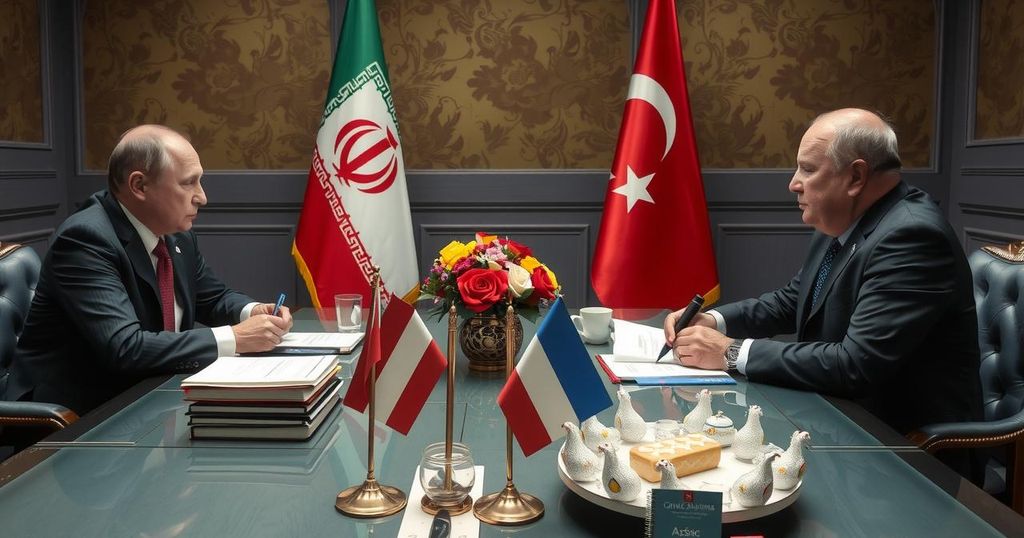Global news
AGENCE FRANCE - PRESSE, ASIA, BASHA, BASHAR AL - ASSAD, CONFLICT, ERDOGAN, EUROPE, EUROPE/ASIA, FIGHTER JETS, HA, HAKAN FIDAN, HAMA, IRAN, MILITARY, REC, REUTERS, RUSSIA, SYRIA, SYRIAN CIVIL WAR, SYRIAN CONFLICT, SYRIAN NATIONAL ARMY, U. S. - BACKED SYRIAN DEMOCRATIC FORCES, UKRAINE, WAR
Marcus Li
0 Comments
Turkey, Russia, and Iran Set to Discuss Syrian Conflict Amid Rebel Advances
Turkey, Russia, and Iran will meet in Qatar to address the recent gains by Islamist rebels in Syria, which have altered the conflict’s dynamics. The discussions will occur during the Doha Forum, focusing on the Astana process aimed at seeking a political solution to the civil war. The situation is critical, with the U.S. actively monitoring developments and concerns about a revitalized ISIS amid intensified fighting.
This weekend, Turkey, Russia, and Iran are anticipated to convene in Qatar to deliberate on a potential response to a significant advancement by rebel forces that has altered the dynamics of the ongoing Syrian civil war. The discussions will occur during the Doha Forum, an international event that draws high-ranking officials and professionals from various sectors.
Turkey’s Foreign Minister, Hakan Fidan, is set to engage with his Russian and Iranian counterparts as part of the Astana process, which aims to establish a political resolution for the conflict that has beset Syria since 2011. The Astana process, initiated in 2017, is a platform supported by these nations wherein their objectives vary, as Turkey advocates for the rebels, while Iran and Russia back President Bashar al-Assad.
Recent developments have seen the Islamist group Hayat Tahrir al-Sham (HTS) seize key territories, including Aleppo and Hama. In a telephone conversation, Russian President Vladimir Putin emphasized the importance of halting hostilities against the Syrian state, to which President Erdogan reiterated Turkey’s stance on Syria’s territorial integrity while calling for Assad to pursue political solutions.
Turkey seeks to mitigate the influence of Kurdish factions that it associates with terrorism, reflecting an overarching regional strategic posture. Meanwhile, the ongoing conflict has seen confrontations between Turkey-backed groups and the U.S.-aligned Syrian Democratic Forces (SDF).
Consequently, the geopolitical landscape remains contentious, especially with the backdrop of Russia’s engagement in Ukraine and ongoing Iranian vulnerabilities due to escalating regional conflicts. Experts suggest that while the HTS gains may coerce Assad’s allies to revisit their strategies, the pivotal question remains whether they will shift their allegiance away from Assad.
The United States is observing these developments closely, maintaining a military presence in Syria to support the SDF and counter the resurgence of ISIS, a critical concern exacerbated by the current unrest and the interplay among local and foreign powers.
The meeting of Turkey, Russia, and Iran on the Syrian crisis reflects ongoing complexities in the region’s geopolitical landscape. The Astana process was established to facilitate multi-party negotiations aimed at resolving the civil war that began over a decade ago. Regional dynamics shifted significantly with Russia and Iran’s military support of Assad juxtaposed against Turkey’s backing of certain rebel factions, leading to conflicting interests that affect the broader security landscape in the Middle East. Recent advances by HTS have further complicated these dynamics, threatening to undermine ceasefires and political negotiations.
In summary, the upcoming talks in Qatar between Turkey, Russia, and Iran underscore a shifting landscape in the Syrian civil conflict. As HTS makes territorial gains, the strategic interests of these nations are increasingly coming into play, with potential implications for the future of Assad’s regime and the broader region. The involvement of the U.S. and the ongoing threat of ISIS highlight the necessity for coordinated international efforts to stabilize Syria and provide humanitarian relief amid a spiraling crisis.
Original Source: www.voanews.com




Post Comment